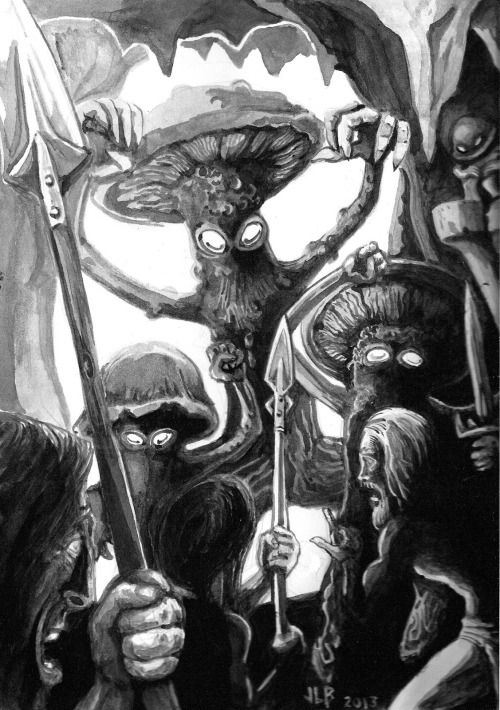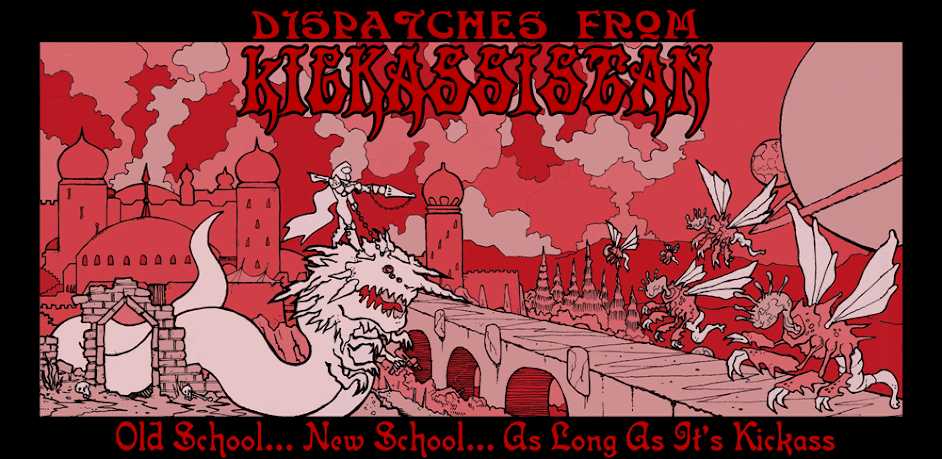 Before I be accused of creating a solution in need of a problem, let me explain what my particular issue with individual initiative is: it's freaking complex! It can be really tough to keep track of the wealth of initiative results a normal DCC session can bring up, especially if players are rolling for each of their characters (such as in a 0-level funnel) individually. Even in one of the larger Metal Gods sessions, I've had to keep track of seven or eight PC inits, a few different monster inits, and it just gets out of hand. That's why I developed what I call "up or down" initiative.
Before I be accused of creating a solution in need of a problem, let me explain what my particular issue with individual initiative is: it's freaking complex! It can be really tough to keep track of the wealth of initiative results a normal DCC session can bring up, especially if players are rolling for each of their characters (such as in a 0-level funnel) individually. Even in one of the larger Metal Gods sessions, I've had to keep track of seven or eight PC inits, a few different monster inits, and it just gets out of hand. That's why I developed what I call "up or down" initiative.I'd like to thank +Claytonian JP for the basis of this system. I read this post of his from G+ ages ago, but couldn't find it again until today and didn't want to write a bunch of crap without proper credit where it's due.
And so, here's how I've been handling initiative in games where individual initiative is used:
Step One: Judge/DM Rolls Init
I'll roll initiative for all of the creatures and NPCs that are in play for the given scenario. Duh. Easy part. I try to keep as few different init rolls as possible on my side of the table, so I'll often roll with the worst initiative bonus out of the NPCS/monsters I've got then sort them out by who's faster or slower later on. I'll announce my init number to the players and it's time for them to roll.Step Two: Player Rolls
Each player rolls once for initiative, no matter how many PCs he controls. If he does control multiple PCs, he'll use the worst init roll out of the ones available to him. I'll also have players tell me if their characters are casting spells at this time or taking any sort of defensive actions (detecting a theme between this and my previous post?).Step Three: "Up" Initiative
Starting at my left and progressing clockwise around the table, I'll ask each player in turn whether they're "up" or not, where "up" means "did you beat my initiative roll?" If the player is "up," they get to act. If they've tied, they're "even" and get to go at the same time I do. If not, they're "down" and get to go after the "evens" have gone.Step Four: "Even" Initiative & My Turn
Typically, there aren't too many "evens," and they know who they are. The evens and I will sort out who's doing what when and to whom, dice are rolled, results are interpreted, the round progresses.Step Five: "Down" Initiative
Again starting with the player at my left and rotating clockwise, anyone who hasn't had the chance to act yet may do so. Once everyone has taken an action, we go back to Step One and re-roll initiative.In theory, just as many dice are rolled in this system as in any other system employing individual initiative. However, rather than writing everything down in a big, ordinally-correct list, this system is fast, easy and keeps track of only three variables: are you up, even or down? I added in re-rolling initiative every round when I realized how easy it is to keep track of "Up or Down" init, which lends a bit of unpredictability and switches things up so every round of combat runs a little bit different from each other. Moving clockwise around the table makes it easy for me to keep track of who's next, who's already gone, etc. +Edgar Johnson and I have been toying with different initiative methods for the past two years, and this is the one that I've found works best for me.
This system would work pretty well for 5e, I think, with its normal post-3e individual initiative. Especially when paired with my suggestions for Old Schooling Up 5e, I think "Up or Down" initiative could go a long way to streamline a potentially complex process.
This model does not make anything easier for group initiative-based games, which already have a pretty simple "I go, you go" character to them.
